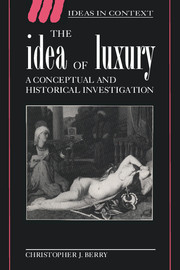3 - The Roman response
Published online by Cambridge University Press: 01 June 2011
Summary
I argued in Chapter 1 that luxury is a component of political morality and remarked that all societies give practical effect through fiscal and legal measures to the distinction between needs and desires. This suggested the hypothesis that different evaluations of desire and different identifications of need result in different conceptions of political order. This chapter tests this hypothesis by examining one instance of the relationship between these factors – the preoccupation of the Roman moralists and legislators with luxury. (We shall have occasion to return to this hypothesis in later chapters.)
Luxury played a central and distinctive role in both Roman thought and practice. This fact is important, and thus worthy of study, in its own right. It is also important historically because until the eighteenth century it was the Roman response to ‘luxury’ that attained paradigmatic status in discussions of virtue and corruption. For the Romans, and beyond, luxury was a political question because it signified the presence of the potentially disruptive power of human desire, a power which must be policed. In that police action the Roman ‘state’ can be seen as enforcing its (negative) evaluation of desire and as underwriting a notion of need that located, or identified it, within a rational or purposive context and in so doing it was – in line with the hypothesis – giving practical effect to its particular conception of political order.
- Type
- Chapter
- Information
- The Idea of LuxuryA Conceptual and Historical Investigation, pp. 63 - 86Publisher: Cambridge University PressPrint publication year: 1994

